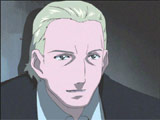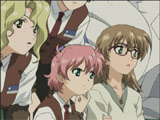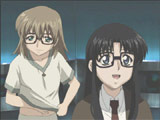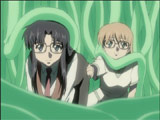

Quick Links:
R.O.D the TV, Volumes 5-7: Novelist and a Gentleman
I've given high praise to the R.O.D TV series since the beginning, so it should not surprise you that I do the same now; however, the series does take a few peculiar turns on its way to the finale. Part is to be expected -- the foes Yomiko faced in the preceding OVA series were pretty outlandish in nature, and so it is with the TV series also. Part is the seductive charm of the convenient plot device, though Her evil is contained. Incongruous plot elements notwithstanding, R.O.D has been a literary pleasure, with some excellent insights.
The last three volumes are quite eventful, but the gist is this: the enemy summons all his eggs to the home basket, and the good guys and girls are craving some omelettes. The dance of good and evil controls most of the stage, but a couple players wait for Godot in Bizarro Land, guarding a bag full of blunts. I almost cried when the series gave in to the temptation of the "protagonist isn't who she thinks she is!" cliché. We waste the better part of two episodes being subjected to this hackneyed nonsense, but the series quickly steadies itself as a gesture of apology. Trust me, you are forgiven.
The other buzz killer is the object of Mr. Bad Guy's plan: Mr. Gentleman, the supposed leader of Great Britain in its heyday (and no doubt the same chap that concocted the revolting combination of Earl Grey and lemon). We're expected to believe that the pursuit of Gentleman's revival is one of pure evil -- part of the ritual includes brainwashing the masses and burning all their books, after all -- but we're never enlightened as to why this fellow's rebirth is tantamount to Armageddon. The plot doesn't require an explanation to function, but I can't shake the feeling that Mr. Gentleman only exists to give the bad guy something to do.
With that out of the way, let us move on to the glowing praise. The first thing I'd like to mention is that the crisis of identity (or creativity, as it were) doesn't change the dynamic of the paper sisters, nor of course their relationship with novelist Nenene Sumiregawa. Their infectious personalities and sisterly bond continue to be the chief strength of the series, even to the end. As a matter of fact, the loyalty displayed on both sides of the conflict is commendable. Perhaps the best example for the opposition is Wendy, who sticks with her boss despite having obvious doubts about his intentions.
The global brainwashing did foster some good material, despite its rude interruption to a great character drama. Here the series makes use of the popular "faint ray of hope" construct, where some amount of good lives on despite a massive onslaught of villainy. The embodiment of this spirit within R.O.D is the underground bookshop of Jinbo-cho known as Toto Books. Toto is a sanctuary for literature, surviving the current assault against knowledge and many before it. A more active vessel of the preservation spirit is Sumiregawa herself, who begins writing a new novel while in captivity. Throughout the series she sends a clear message, that no power on Earth will stop her from speaking her mind.
Even at the height of This Couldn't Actually Happen Hour, Nenene comes through with some much-needed sanity. Her monologue for free expression is so powerful, in fact, that one is inclined to suppress the confusion arising from the giant green "Gentleman" tentacles engulfing a helpless kid while the heros and villains have their little ideological spat. Nenene was always full of surprises, which played well against the stable patterns of the paper sisters. While it seemed at first that R.O.D was all about the paper sisters, it ended up being more about Nenene asserting her individuality with their support. I think being exposed to Michelle, Maggie, and Anita can help anyone find inspiration.
R.O.D the TV rekindled my love for stories in a big way. It's not only the characters that are lovable. It's the warm depiction of family living, love and friendship. It's the thrill of fighting the good fight to preserve knowledge and individual liberty (in opposition to, funny enough, western mind control). And most of all, it's the proliferation of ideals and ideas that last longer than a tub of popcorn. This series is special.





